Stephen W. Hiemstra's Blog, page 268
March 6, 2015
Jesus: Honored are the Poor in Spirit

Photo by Stephen W. Hiemstra
“Blessed are the poor in spirit, for theirs is the kingdom of heaven.” (Matt 5:3 ESV)
Jesus honored 3 tensions within ourselves: poverty of spirit, grief, and meekness. Today, we look at poverty of spirit.
Jesus chose words carefully. If Jesus spoke Hebrew rather than the Greek recorded in the New Testament, then Matthew 5:3 could be written in only 7 words [1]. This is a remarkable economy of language [2].
In cultures where books are enormously expensive, as in first century Israel, important texts are memorized. Today we see this behavior among young Islamic students in Afghanistan who memorize the Koran. An audience of such students would immediately associate words with such familiar texts, like a long-married couple completing each other’s sentences [3].
Following this line of thinking, the first phrase in Matthew 5:3, “blessed are the poor in spirit”, would for Jesus’ disciples bring two texts to mind:
“Blessed is the man who walks not in the counsel of the wicked, nor stands in the way of sinners, nor sits in the seat of scoffers; but his delight is in the law of the LORD, and on his law he meditates day and night.” (Psalm 1:1-2 ESV)
and
“The Spirit of the Lord is upon me, because he has anointed me to proclaim good news to the poor. He has sent me to proclaim liberty to the captives and recovering of sight to the blind, to set at liberty those who are oppressed, to proclaim the year of the Lord’s favor.” (Luke 4:18-19 ESV)[4]
The first text links through the Greek word, makarios, which would seem an odd choice because the more typical word for blessed in Greek would be eulogetos (France 2007, 161). The second text links through the word, poor (πτωχοὶ). Psalm 1 plainly references the Law of Moses; Luke 4 comes from Jesus’ own “call sermon” and it closes paraphrases Isaiah 61.
The expression, poor in spirit [5], is frequently highlighted in sermons because in Luke’s version of this Beatitude reports Jesus only referring to being poor. Luke writes: “Blessed are you who are poor, for yours is the kingdom of God.” (Luke 6:20 ESV) The word, poor, here refers not to low income, but rather destitution to the point of begging for food (Neyrey 1998, 170-171). The inference in both Matthew and Luke is according one of total dependence on God—someone entirely humbled by the circumstances of life. As a disciple and likely eyewitness to the Sermon on the Mount (where Luke was likely not an eyewitness), Matthew’s rendering of poor in spirit is likely a better statement of what Jesus was trying to say.
Jesus’ use of a legal framework—a form borrowed from case law, if X, then Y—to make his points is highly ironic, even subversive. In this case, the basic idea is that the poor will inherit a kingdom could be taken as obvious hyperbole (we expect rich children to inherit from rich parents). A refined notion of the humble becoming kings is equally hyperbolic. Kings are not normally thought to humble people! Neyrey’s (1998, 164) notion that Jesus is re-framing the honor code of his culture makes more sense. Humility is, after all, fundamental to the Prophet Isaiah’s vision of God’s suffering servant [6]—a biblical example of someone described as poor in spirit.
Still, Jesus’ tying of the poor in spirit to the kingdom of heaven also carries a sense of judgment. The idea here is that those who refuse to be poor in spirit (in other words,the proud) stand in opposition to the kingdom of heaven. Remember that Matthew’s previous two uses of the phrase, kingdom of heaven, come in the context of judgment: “Repent, for the kingdom of heaven is at hand.” (Matt 3:2,4:17 ESV) We can either hear these words aspirationally or feel the tension between a kingdom that has arrived and still not yet. In any case, the judgment in focus here falls on those refusing to be humble—the proud—who are expressly named in Matthew 5:20 as the scribes and pharisees who stand in opposition to the kingdom of heaven [7].
Jesus chose words carefully.
[1] שְׁרֵי עֲנִיֵּי הָרוּחַ כִּי לָהֶם מַלְכוּת הַשָּׁמָיִם׃ (Matt 5:3 HNT)
[2] Bivin and Blizzard (1994, 20) argue that Jesus spoke primarily Hebrew, not Aramaic or Greek. Outside of liguistic evidence from the New Testament itself, they cite discoveries in the Dead Sea Scrolls that show commentaries written primarily in Hebrew. This suggests that the dominant language in the first century in Israel was Hebrew.
[3] Spangler and Tverberg (2009, 38) write: “To increase the impact of a statement, rabbis would quote part of a Scripture and then let their audience fill in the rest.” For example, Jesus does this in Matthew 21:16 citing Psalm 8.2.
[4] “The Spirit of the Lord GOD is upon me, because the LORD has anointed me to bring good news to the poor; he has sent me to bind up the brokenhearted, to proclaim liberty to the captives, and the opening of the prison to those who are bound; to proclaim the year of the LORD’s favor, and the day of vengeance of our God; to comfort all who mourn; to grant to those who mourn in Zion– to give them a beautiful headdress instead of ashes, the oil of gladness instead of mourning, the garment of praise instead of a faint spirit; that they may be called oaks of righteousness, the planting of the LORD, that he may be glorified.” (Isaiah 61:1-3 ESV)
[5] The expression, poor in spirit, is used no where else in the bible. The Latin phrase used for this characteristic is: Hapax legomenon.
[6] “Behold my servant, whom I uphold, my chosen, in whom my soul delights; I have put my Spirit upon him; he will bring forth justice to the nations. He will not cry aloud or lift up his voice, or make it heard in the street; a bruised reed he will not break, and a faintly burning wick he will not quench; he will faithfully bring forth justice.” (Isaiah 42:1-3 ESV)
[7] “For I tell you, unless your righteousness exceeds that of the scribes and Pharisees, you will never enter the kingdom of heaven.” (Matt 5:20 ESV)
REFERENCES
Bivin, David and Roy Blizzard. 1994. Understanding the Difficult Words of Jesus: New Insights from a Hebraic Perspective. Shippensburg, PA: Destiny Image Publishers.
France, R.T. 2007. The Gospel of Matthew. New International Commentary on the New Testament. Grand Rapids: Eerdmans.
Neyrey, Jerome H. 1998. Honor and Shame in the Gospel of Matthew. Louisville: Westminster John Knox Press.
Spangler, Ann and Lois Tverberg. 2009. Sitting at the Feet of Rabbi Jesus: How the Jewishness of Jesus Can Transform Your Faith. Grand Rapids: Zondervan.

March 4, 2015
Keller Argues the Case for God
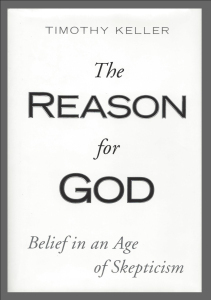 Timothy Keller. 2008. The Reason for God: Belief in an Age of Skepticism. New York: Dutton.
Timothy Keller. 2008. The Reason for God: Belief in an Age of Skepticism. New York: Dutton.
Review by Stephen W. Hiemstra
An old saw goes: “you can’t argue someone out of something that they weren’t argued into”. Many people adopt illogical positions that suit their needs. A common argument goes: I want to control my own life, therefore God must not exist. The banality of such arguments helps explain my attraction to apologetics—the use of logic to defend of the faith.
In his book, The Reason for God, Keller notes an interesting statistic:
“10-25 percent of all the teachers and professors of philosophy in the country [U.S.] are orthodox Christians, up from less than 1 percent just thirty years ago.” (x)
Perhaps I am not the only one tired of incoherent arguments. In his efforts to organize Redeemer Presbyterian Church in Manhattan New York, Keller observed that while many people are leaving the church today, many inner-city young professionals are attracted to orthodox believing churches that offer strong arguments for faith (xiv). These are people who base their faith not on where their parents attended church but on carefully considering the alternatives. Keller notes: “You cannot doubt Belief A except from a position of faith in Belief B.” (xvii) Jesus himself respected those who honestly admit and struggle with their doubts to come to faith (Mark 9:24; xxiii)
What does an orthodox believing church look like? Keller writes:
“The new, fast-spreading multiethnic orthodox Christianity in the cities is much more concerned about the poor and social justice than Republicans have been, and at the same time much more concerned about upholding classic Christian moral and sexual ethics than Democrats have been.” (xx)
Who is Timothy Keller? The jacket on his book says that he was raised in Pennsylvania. His seminary education took him to Gordon-Conwell Theological Seminary (South Hamilton, MA) and later to Westminster Theological Seminary (WTS; Philadelphia). WTS is the flagship seminary of the Presbyterian Church in America (PCA).
Keller lays out his book in 14 chapters divided into 2 parts (Leap of Doubt/The Reasons for Faith). The chapters are:
Part 1: Leap of Doubt
There Can’t Be Just One True Religion
How Could a Good God Allow Suffering?
Christianity is a Straitjacket
The Church is Responsible for So Much Injustice
How Can a Loving God Send People to Hell?
Science has Disproved Christianity
You Can’t Take the Bible Literally
Part 2: The Reasons for Faith
The Clues of God
The Knowledge of God
The Problem of Sin
Religion and the Gospel
The (True) Story of the Cross
The Reality of the Resurrection
The Dance of God (vii-viii)
These chapters are preceded by an introduction and followed by an epilogue, acknowledgments, notes, and an index.
Keller’s approach in apologetics is to provide a detailed list of arguments and counterarguments consistent with traditional apologetics. This approach makes sense because frequently people struggling with their faith get hung up on particular stumbling blocks which, once removed, allows them a more normal journey of faith to proceed.
An important stumbling block for many people is the question of human suffering. The classic argument offered by atheists is: how could an all-powerful, loving God allow suffering? Either God is not all-powerful or God is not loving. Keller notes the story of Joseph who was sold by his brothers into slavery in Egypt, but ends up prime minister of Egypt. Keller asks: what was the role of suffering in Joseph’s life? (24). He also notes that atheists have a curious agenda in posing this question about God’s attributes because natural selection, taken in the process of evolution, depends directly on death, destruction, and suffering of weaker individuals. Holding such a detestable theory so close to heart, how then can the atheist suddenly have standing to question God’s fairness and goodness? (26)
For me, the most memorable chapter in Keller’s book was entitled: The Dance of God. Keller asks: “What does it mean…that the Father, Son, and Holy Spirit glorify each other?” He goes on to write: “The life of the Trinity is characterized not by self-centeredness but by mutually self-giving love. When we delight and serve someone else, we enter into a dynamic orbit around him or her, we center on the interests and desires of the other. That creates a dance…The early leaders of the Greek church had a word for this—perichoresis.” (214-215) Perichoresis is the Trinity modeling life in community for the church.
Keller’s book ends with an invitation to faith. Citing Flannery O’Connor, he writes: “To Know oneself, is above all, to know what one lacks.” (227) The hope of our age is that we will individually and collectively wake up—like the drunk who wakes up in an alley—and recognize that we desperately need God. Keller advises—take a spiritual inventory—identify your own stumbling blocks (231). Then, repent, believe in Christ, and find a community of faith (232-235).
March 2, 2015
Neyrey Explains Honor and Shame, Part 2
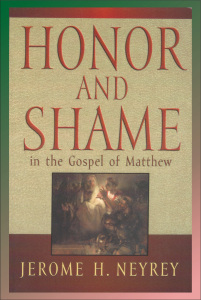 Jerome H. Neyrey. 1998. Honor and Shame in the Gospel of Matthew. Louisville: Westminster John Knox Press.
Jerome H. Neyrey. 1998. Honor and Shame in the Gospel of Matthew. Louisville: Westminster John Knox Press.
Review by Stephen W. Hiemstra
Neyrey organizes his discussion of honor like an anthropologist into 7 categories:
Definition of honor,
Sources of honor,
Conflict and honor,
Display and recognition of honor,
Collective honor, and
Gender and honor (14-15).
Under sources of honor, for example, Neyrey notes that honor can be both ascribed as in being born into a well-known family or achieved as in earning special merit (15).
Shame, by contrast, is the opposite of honor—loss of respect, regard, worth, and value in the eyes of others. A shameless person does not care what people think of them (30). Because honor and shame are displayed publicly, our individualistic culture downplays both honor and shame.
Honor must, of course, be defended. Neyrey notes 4 steps into challenges to honor and response—reposte:
Claim to honor,
Challenge to that claim,
Riposte to the challenge, and
Public verdict by onlookers (44).
Neyrey (51) sees many examples of challenge and riposte in Matthew. For example in Matthew 9: 1-8 we see:
Claim to honor: “Take heart, my son; your sins are forgiven.” [Divinity claim] (v 2)
Challenge: “This man is blaspheming.” (v 3)
Riposte: “Which is easier…Rise, pick up your bed and go home.” (vv 5-6)
Verdict: “When the crowds saw it, they were afraid…” (v 8)
Much of Neyrey’s book focuses on the details of Matthew’s encomium of Jesus. For example, Matthew portrays Jesus as just in performing his duties to God, his parents, and the dead (109). Jesus is faithful to God (his heavenly patron) even until death (Matt 26:39; 110). He defended the rights of parents over traditions, like “korban” (Matt 15:5). While Neyrey skips over the question of just for the dead, clearly Jesus’ teaching about eternal life would also honor the dead.
A key hypothesis that Neyrey advances is to read the Sermon on the Mount as reforming the honor code of his society. Neyrey writes:
“Jesus did not overthrow the honor code as such, but rather redefined what constitutes honor in his eyes and how his disciples should play the game…For example, he forbade his disciples to play the typical village honor game by forswearing honor claims (i.e. boasting), challenges (i.e. physical and sexual aggressiveness), and ripostes (i.e. seeking satisfaction and revenge). Moreover, he attempted to redefine whose acknowledge (i.e. grant of honor) truly counts…Jesus , then, changed the way the honor game was played and redefined the source of honor, name, acknowledgment by God, not by neighbor.” (164).
Most importantly in this respect, Neyrey suggests that the Greek words “makarios” and “ouai” be translated as esteemed or honorable (not blessed or happy) and as shame on or disrespectable (165-166). In this way, Jesus is redefining the honor code that applies to his disciples.
Neyrey also sees Jesus redefining shame in the last “makario”. This verse in Matthew reads: “Blessed are you when others revile you and persecute [drive out] you and utter all kinds of evil against you falsely on my account.” (Matt 5:11 ESV) Neyrey sees this verse addressing the problem of a son being disinherited for becoming Jesus’ disciple rather than being generally persecuted (169). In other words, what society took as dishonorable, Jesus redefined as honorable.
Following Neyrey, the Sermon on the Mount can be read as Jesus offering more than your typical a pep talk to his disciples who needed reassurance. He was commissioning them to a higher calling. This calling was something worth dying for or, more importantly, something to live for.
Clearly, this reading is as important today as it was then.
March 1, 2015
Prayer Day 18: A Christian Guide to Spirituality by Stephen W. Hiemstra
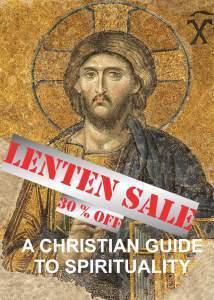
Goto: http://bit.ly/T2PNEUMA, Enter discount code: 83WZLNW4
Loving Father. Beloved Son. Forgiving Spirit. We praise you for your love and forgiveness. Redeem us from our sin; empower our lives with new meaning. In the power of your Holy Spirit, grant us new status as children of God and allow us to enter your work of reconciliation. In Jesus’ precious name, Amen.
Padre Amoroso, Hijo Amado, Espíritu de Perdón. Te alabamos por tu amor y perdón. Redima nos de nuestros pecados; empodera nuestras vidas con significados nuevos. En el poder de tu Espirita Santo, anime nos un estado nuevo como hijos y hijas de Dios y permite nos a entrar tu obra de reconciliación. En el precioso nombre de Jesús oramos, Amén.

February 27, 2015
The Beatitudes

Art by Stephen W. Hiemstra
“Serve the LORD with fear, and rejoice with trembling. Kiss the Son, lest he be angry, and you perish in the way, for his wrath is quickly kindled. Blessed are all who take refuge in him.” (Psalm 2:11-12 ESV)
By Stephen W. Hiemstra
The Beatitudes appear in both Matthew’s and Luke’s Gospel immediately after Jesus calls his disciples [1]. In Matthew, we are given the impression that this is an early point in Jesus’ public ministry because chapter 4 occurs right after Jesus’ baptism and starts with his temptation in desert. Furthermore, Jesus’ teaching in chapter 4 sounds a bit like John the Baptist: “Repent, for the kingdom of heaven is at hand.” (Matt 4:17 ESV) In Luke, our impression is a later point in Jesus’ ministry because Jesus’ life is threatened after he heals a man with a withered man on the Sabbath (Luke 6:7-11). In either case, the Beatitudes appear as a special sermon in a commissioning service for his disciples. The disciples’ call to follow Jesus is a call to share in his life of ministry. Jesus tells them: “Follow me, and I will make you fishers of men.” (Matt 4:19 ESV)
Sharing in Jesus’ life is, however, is also to share in his suffering.
This message is clear both from the content of the Beatitudes, but also in the content of Jesus’ life. From the point of conception and birth, Jesus’ life is threatened. Divine intervention is required twice to keep his family together and to escape from the murderous King Herod (Matt 1:18-25; 2:1-13). In ministry, Jesus is baptized by John who is himself arrested and later beheaded (Matt 4:12; 14:10). Summarizing this point, Bonhoeffer (1995, 89) writes: “When Christ calls a man, he bids him to come and die.” In so many words, the disciples are being commissioned in the Beatitudes to take up a life and ministry characterized by tension. We know this because 10 of the 11 faithful disciples died a martyr’s death (Fox and Chadwick 2001, 10).
The Beatitudes take their name from the Latin translation, beati, of the Greek word, makarios (μακάριος), which Jesus repeats 9 times. It means “humans privileged recipient of divine favor”. It can also mean: “favored, blessed, fortunate, happy, privileged” (BDAG 4675, 2, 2a) In the Bible, repetition always implies emphasis. Twice is emphasis; 3 times is highly emphatic; 9 times is seriously emphatic and unprecedented—a string of pearls [2]. Reinforcing these repetitions, Matthew pictures Jesus as the new Moses issuing law on a mountain, while Luke cites both blessings and curses (woes) patterned after the law itself in Deuteronomy 28.
Jesus’ repeated use of the Greek word, Makarios, is hardly an accident. In the Greek Old Testament, Makarios appears in the first verse of Psalm 1:
“Blessed is the man who walks not in the counsel of the wicked, nor stands in the way of sinners, nor sits in the seat of scoffers; but his delight is in the law of the LORD, and on his law he meditates day and night.” (Psalm 1:1-2 ESV)
This is a clear call to holiness as defined in God’s law. It also appears to 2 significant Messianic texts: Psalm 2 and Isaiah 30. The immediate context of Psalm 2, cited above, calls on the faithful to serve the king while he is in good humor, but begins with an ominous warning: “Why do the nations rage and the peoples plot in vain?” (Psalm 2:1 ESV) Clearly, not everyone is excited to see the King! Immediately after the cite in Isaiah 30, God makes an interesting promise for those that wait for him: “And though the Lord give you the bread of adversity and the water of affliction, yet your Teacher will not hide himself anymore, but your eyes shall see your Teacher.” (Isaiah 30:20 ESV) The Hebrew word for teacher has a second meaning—early rain [3]. In a dry region like Israel, early rain is itself a blessing. Both citations speak of tension—Psalm 2 refers to political tension and Isaiah 30 refers to adversity and affliction. Psalm 1 pictures integration (the opposite of tension) with ourselves, with others, and with God through obedience to God’s law.
In commissioning the disciples, Jesus gives them more than your typical pep talk to sales associates; he redefined what honor means (Neyrey 1998, 164). In the extreme case, he re-framed dishonor in the world as honorable in his eyes. Jesus said:
“Blessed are you when others revile you and persecute you and utter all kinds of evil against you falsely on my account. Rejoice and be glad, for your reward is great in heaven, for so they persecuted the prophets who were before you.” (Matt 5:11-12 ESV)
In other words, heavenly rewards follow from earthly persecution. And, oh, by the way, you are not the first to be persecuted.
[1] The calling of the disciples occurs in Luke 6:13-16 and Matthew 4:18-22. The Beatitudes follow in Luke 6:20-26 and Matthew 5:3-12.
[2] The term, a string of pearls, refers to Ben Azzai, a second century Rabbi (Stangler and Tverberg 2009, 43).
[3] ( מוֹרֶיךָ (Isa 30:20 WTT)).
REFERENCES
Bonhoeffer, Dietrich. 1995. The Cost of Discipleship (Orig. pub. 1937). New York: Simon and Schuster.
Fox, John and Harold J. Chadwick. 2001. The New Foxes’ Book of Martyrs (Orig Pub 1563). Gainsville, FL: Bridge-Logos Publishers.
Neyrey, Jerome H. 1998. Honor and Shame in the Gospel of Matthew. Louisville: Westminster John Knox Press.
Spangler, Ann and Lois Tverberg. 2009. Sitting at the Feet of Rabbi Jesus: How the Jewishness of Jesus Can Transform Your Faith. Grand Rapids: Zondervan.

February 25, 2015
Neyrey Explains Honor and Shame, Part 1
 Jerome H. Neyrey. 1998. Honor and Shame in the Gospel of Matthew. Louisville: Westminster John Knox Press.
Jerome H. Neyrey. 1998. Honor and Shame in the Gospel of Matthew. Louisville: Westminster John Knox Press.
Review by Stephen W. Hiemstra
A frequent comment in the church today is the need to stop using all those “churchy” words. While the definition of “churchy” may be up for grabs, the focus of these comments is usually on words that have in the postmodern context lost their meaning. Verses, such as—“Worthy are you, our Lord and God, to receive glory and honor and power…” (Rev 4:11 ESV)—almost certainly be classified as knee-deep in churchy words, because our buddy culture admits no one worthy of praise, glory or honor or of titles such as Lord and God.
In his book, Honor and Shame in the Gospel of Matthew, Jerome H. Neyrey states his objective plainly: “This book focuses on the praise of Jesus of Nazareth as presented in narrative form by the evangelist Matthew.” (1) Neyrey sees gospel as a type of ancient writing form called an encomium which is a structured biography designed to offer praise (2). The rules for writing such encomium were the subject of rhetorical handbooks, starting with Aristotle. Neyrey (4) writes:
“Nothing in the exercise of praise was left to chance, for students were instructed concerning the form of speech of praise, as well as the specific content of each element in that form. They learned to organize their praise according to the conventional manner of presenting a person’s life from birth to death and in light of specific rules for developing praise at each state of life.”
Honor (τιμη) is the “worth or value of persons both in their own eyes and in the eyes of the village or neighborhood”…“concern for ‘honor’ as reputation and ‘good name’ was endemic to the ancient world…” (5)
An important assumption in some biblical interpretation is that honor and shame play a same role in our own culture as in biblical culture. Cultural anthropologist sometimes describe American culture today as a guilt-innocence culture where guilt is only triggered when a law has been transgressed and shame, if experienced at all, is trigger when a law is broken and publically exposed. The shame and guilt so important in biblical culture has lost its meaning. Complaints about the meaninglessness of “churchy” words underscore an important cultural shift that renders aspects of the biblical witness out of reach.
Neyrey writes in 10 chapters divided into 3 parts:
Part One: Matthew: In Other Words
Honor and Shame in Cultural Perspective
Reading Matthew in Cultural Perspective
Part Two: Matthew and the Rhetoric of Praise
The Rhetoric of Praise and Blame
An Encomium for Jesus: Origins, Birth, Nurture, and Training
An Encomium for Jesus: Accomplishments and Deeds
An Encomium for Jesus: Deeds of the Body and Deeds of Fortune
An Encomium for Jesus: A Noble Death
Part Three: The Sermon on the Mount in Cultural Perspective
Matthew 5:3-12—Honoring the Dishonored
Matthew 5:21-28—Calling Off the Honor Game
Matthew 6:1-18—Vacating the Playing Field (v).
These chapters are preceded by an introduction and followed by a bibliography and indices.
Neyrey is a tough read. Not only is it hard to follow the arguments, the arguments challenge important preconceptions that we hold in reading scripture. What happens if the “Jesus in our head” is not the Jesus of the bible? What if our kids hear something different than what we do during the Sunday morning service? These are important questions which directly affect our interpretation of scripture and experience of church. In Part 2 (look for the post on Monday, March 2), I will explore Neyrey’s arguments in more detail.
http://www.knowledgeworkx.com/blogs/knowledgeworkx/item/141-three-colors-of-worldview.
February 23, 2015
Fairbairn: The Trinity Models Relationship in Community, Part 2
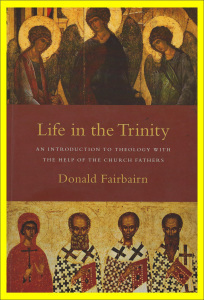 Donald Fairbairn. 2009. Life in the Trinity: An Introduction to Theology with the Help of the Church Fathers. Downers Grove: IVP Academic.
Donald Fairbairn. 2009. Life in the Trinity: An Introduction to Theology with the Help of the Church Fathers. Downers Grove: IVP Academic.
Review by Stephen W. Hiemstra
The centrality of John 13-17 in Fairbairn’s picture of the scarlet thread running through the understanding of the early church fathers of our life in Christ is both obvious and mysterious. It is obvious because these chapters contain some of Jesus’ last words before his crucifixion. It is mysterious, in part, because John skips things highlighted in the other Gospels, like Jesus’ prayer in the Garden and the last supper, and includes things, like the washing of the disciple’s feet, not included elsewhere (13-16). Jesus’ enigmatic discussion in the upper room about his relationship with the Father is probably the most mysterious narrative in the entire New Testament.
The complementary relationship between this upper room discourse and Jesus’ high priestly prayer suggests that John feels it important—a kind of Hebrew doublet. Fairbairn (28) writes:
“In the discourse, Jesus has laid out a picture of life as God intends it, and in the prayer, he asks his father to bring about the kind of life he has just described to the disciples.”
However, these are also some of Jesus’ last words making this a doublet that today would be written in red and underlined, so to speak. For this reason, these chapters got the attention of early church fathers. Summarizing, Fairbairn writes: “our sharing the Father-Son relationship is at the center of what it means for us to participate in God.” (37) And: “the doctrine of the Trinity is the gateway to understanding Christian life.” (50)
If you accept Fairbairn’s conclusions, entering the deep end of the pool theologically is clearly not optional . Fairbairn suggests that we were created to share in the life of the Trinity as evidenced by the early life of Adam and Eve in the Garden of Eden and by our creation in the image of a Triune God. Being created in the image of God sets humanity apart from plants, animals, and even angels (60) and sets humanity apart from them even after the fall.
But what does this life in the Trinity look like? Fairbairn (65) sees 4 obvious benefits to having fellowship with the Trinity:
Significance—our significance lies not in what we do, but to whom we belong (67);
Peace—The peace of God is more than the absence of conflict, it shares a calmness even in the storms of life (69) and includes the tutorage of the Holy Spirit throughout (70);
Work—our attitude towards work is transformed. The apostle Paul writes: “I worked harder than any of them, though it was not I, but the grace of God that is with me.” (1 Cor 15:10 ESV) To redeem work is to return to the Garden of Eden where our work began.
Human relationships—If God loves humanity, then so should we and we see people differently (81).
Fairbairn (224) writes:
“We are called to reflect the Father’s love for the Son, and part of the way we do that is by serving the least of the believers—the neediest, the ones who are the loneliest, the ones who suffer the most in this fallen world.”
Perhaps the most important contribution Fairbairn makes, in my estimation, is to our understanding the depth that sin has broken our relationship with God and neighbor. Sin, he writes, “is what happens when have two children in the same room with one toy” (87). This brokenness dominates who we are and how we relation to both God and neighbor. The curse of sin involves two parts: physical death and spiritual death—separation from God (98). We are twisted to the point that we do not even recognize our own depravity. Adam and Eve had no reason to doubt God’s word in the garden and no reason to trust the serpent’s words: “For God knows that when you eat of it your eyes will be opened, and you will be like God, knowing good and evil.” (Gen 3:5 ESV) The word, know, here in Hebrew (yada) means more than simply knowledge, it implies being able to decide (93). In order words, Adam and Eve not only wanted to understand good and evil, they wanted to determine what is good and evil for themselves—to play god.
It is only by fully understanding the depth of our own depravity, we can appreciate the need for God’s promise, the incarnation of Christ, and the gift of redemption. The lost sense of sin is accordingly at the heart of the modern and postmodern shamelessness and inattention to faith.
As is always the case with good books, it is not just the interesting details but how they hang together to make the text sing. This is a text that clearly sings.

February 22, 2015
Prayer Day 17: A Christian Guide of Spirituality by Stephen W. Hiemstra

Goto: http://bit.ly/T2PNEUMA, Enter discount code: 83WZLNW4
Loving Father. Beloved Son. Compassionate Spirit. We praise you for your example of unity in holiness. Set us apart in holiness; draw us together. Encourage us to use our spiritual gifts for the common good and to rejoice when others do too. In Jesus’ precious name, Amen.
Padre amoroso. Hijo Amado, Espíritu de Compasión. Te alabamos por tu ejemplo de unidad en santidad. Diferencia nos en santidad; Atrae nos juntos. Anime nos a utilizar nuestros dones espiritual para el bien común y a regocijar cuando también los demás lo hacen. En el precioso nombre de Jesús, Amén.

February 20, 2015
Tension with God
 “if you confess with your mouth that Jesus is Lord and believe in your heart that God raised him from the dead, you will be saved.” (Rom 10:9 ESV)
“if you confess with your mouth that Jesus is Lord and believe in your heart that God raised him from the dead, you will be saved.” (Rom 10:9 ESV)
By Stephen W. Hiemstra
The idea of tension with God comes as surprise to many Christians. Three reasons stand out:
A focus on the humanity of Christ and off of the divinity of Christ leaves many Christians ignorant of the urgings of the Holy Spirit;
A focus on conversion and off of sanctification—the process of nurturing our faith—leaves many Christians living secular lifestyles; and
Ignorance of sin blinds us to our true selves in Christ, to our neighbors, and to God.
Robbed of the power of God in their lives, Christians are lulled into believing in a kind of tension-free, ersatz Christianity that presumably insulates them from the problems of life. When life’s problems arise, they are then angry with God and their ersatz Christianity provides no substantive guidance for dealing with it. Many leave the church and return later—if at all—in a casket. Got tension?
Humanity versus Divinity of Christ. Our secular society has no trouble with Jesus’ humanity, but his divinity is repeatedly questioned. If Christ is only human, then his authority shrinks to that of an interesting teacher or story teller. Christian claims on society shrink to that simply of another interest group. Conversion amounts to nothing more than being convinced to join a religious club and sanctification need not be taken seriously. Clearly, if Christ is not divine, then there is no point in reading further.
Conversion versus Sanctification. Over the centuries, sincere Christian leaders have debated this question of conversion versus sanctification. For example, Jonathan Edwards, thought by many to have been the great American theologian of all time, was dismissed by his Northhampton church in 1750 for advocating that members have personal relationship with Jesus . The question addressed here, however, is different. Once one has avoided the pitfalls of ersatz Christianity and seriously begins a disciple’s journey with Christ, how could there still be tension with God?
This is not a trivial question. I remember at one point posing this question to a dear friend who is a Charismatic leader and who is experienced in deliverance ministry. My question was—how could it be true that a Christian could experience spiritual oppression?
As it turns out, this is exactly the problem faced by the Prophet Job. Scripture describes Job as a man: “blameless and upright, one who feared God and turned away from evil.” (Job 1:1 ESV) Still, God tells Satan: “Behold, all that he [Job] has is in your hand. Only against him do not stretch out your hand.” (Job 1:12 ESV) Do you think that Job felt spiritual oppression? Do you think Satan’s afflictions created tension between Job and God?
The life of the Apostle Paul is also instructive. When God told Ananias to go and baptize Saul, he questioned God’s intentions. “But the Lord said to him, Go, for he is a chosen instrument of mine to carry my name before the Gentiles and kings and the children of Israel. For I will show him how much he must suffer for the sake of my name.” (Acts 9:15-16 ESV) Paul was essentially called as a Christian and an Apostle to the gentiles to suffer for the Name. Do you think Paul’s calling created tension in his life, with others, and with God? Paul himself described the life he gave up as a Rabbi and a Jew as rubbish (Phil 3:8) compared to what he gained as a believer. Still, he met every sort of affliction during his ministry [2].
Ignorance of Sin. Even a hardened atheist needs to worry about sin. Sin can be: (1) doing evil, (2) breaking a law, or (3) failing to do good. Sin cuts us off from ourselves, from our neighbors and from God leading to tensions in all three dimensions. Ignoring sin is like driving too fast on an icy road or throwing dirty sand in your gas tank—it can hurt others and messes everything up.
God’s forgiveness through Christ sets us right with God and may help relieve our guilt, but does not reverse the effects of sin on our person and on others. God can forgive the murderer, for example, but that does not bring the dead person back to life or relieve the perpetrator of punishment under law. A selfish person acting impulsively tenses up many people’s lives and it is ignorant of God.
Tension with God arises is no different that tension in any human relationship. Avoiding sin, which cuts us off from God, has the effect of opening up communication channels and allows us to perceive the promptings of the Holy Spirit. In this way, sanctification can proceed. Still, transformation—pursuing godliness—involves sacrifice and pain. The ebb and flow of our attention to God brings tension, in part, because we are not always anxious to step out in faith to embrace transformation. In this sense, our tension with God is transformative.
Jesus offers blessings for disciples who faithfully pursue godliness:
Blessed are those who hunger and thirst for righteousness, for they shall be satisfied.
Blessed are the merciful, for they shall receive mercy.
Blessed are the pure in heart, for they shall see God. (Matt 5:6-8 ESV)
Notice how these blessings follow from modeling our lives after attributes of God himself—righteousness, mercy, and holiness—to become pure in heart. This is the heart of the new covenant in Christ.
Noll (2002, 45) writes: “The dismissal occurred when Edwards abandoned his grandfather Stoddard’s practice of open communion and instead began to insist that candidates for church membership (and the privilege of communion) offer a convincing statement of saving faith”.
[2] “Are they servants of Christ? I am a better one– I am talking like a madman– with far greater labors, far more imprisonments, with countless beatings, and often near death. Five times I received at the hands of the Jews the forty lashes less one. Three times I was beaten with rods. Once I was stoned. Three times I was shipwrecked; a night and a day I was adrift at sea; on frequent journeys, in danger from rivers, danger from robbers, danger from my own people, danger from Gentiles, danger in the city, danger in the wilderness, danger at sea, danger from false brothers; in toil and hardship, through many a sleepless night, in hunger and thirst, often without food, in cold and exposure. And, apart from other things, there is the daily pressure on me of my anxiety for all the churches.” (2 Cor 11:23-28 ESV)
References
Noll, Mark A. 2002. America’s God: From Jonathan Edwards to Abraham Lincoln. New York: Oxford University Press.

February 18, 2015
Who is God to You?
By Stephen W. Hiemstra
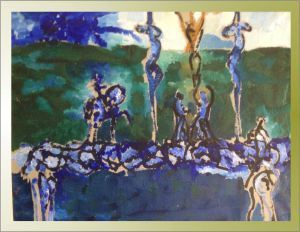
The Crucifixion
Trinity Presbyterian Church, Herndon, Virginia, February 18, 2015 (translated from Spanish)
Introduction
Good morning. Welcome to the Luncheon for the Soul here at Trinity Presbyterian Church.
My name is Stephen Hiemstra. I am a volunteer from Centreville Presbyterian Church.
Today is Ash Wednesday, which is the first day of Lent. Lent begins 40 days before Easter. Traditionally, Lent is a time of reflection over our sins because Christ died for our sins on the cross. For this reason, our text today, Psalm 51, focuses on this theme.
Scripture lesson: Psalm 51
Invocation
Let’s pray.
Almighty father, beloved Son, Spirit of Truth. Thank you for the peace and healing that we experience in your presence. We are grateful for the life, death, and resurrection of your Son, Jesus Christ, who made this reality possible. Open our eyes to your presence here among us this morning. In the precious name of Jesus, Amen.
Me
Who is God to you? (2X)
A few years back I had a supervisor who needed to tell me bad news. He did not want me to continue working on my favorite project. He told me one, two, three times.. Each time I only heard good news. It was necessary for he to tell me–NO, NO, NO–another time rather directly because my ears only heard the opposite–YES, YES, YES.
Many times we hear and see only the things we want to. The challenge is that we need to change the focus of our activities to grow, to transform our lives.
We
Who is God to you? (2X)
In the story of Moses and the burning bush, God told Moses exactly the pain that he felt in his own heart. What did he say? God told him: return to Egypt and tell Pharaoh to: “Let my people go” (2X) (Exodus 5:1). Why? Because Moses wanted to rescue his people from slavery to the Egyptians but he was afraid even to say the words. For this reason, God sent Moses back to Egypt to accomplish the very thing in his own heart. And to help Moses deal with his fear, God promised: “I will be with you!” (2X) (Exodus 3:12)
Aren’t we just like Moses? Don’t we want until God tells us and until then we are too afraid?
What challenge in your heart is God reminding you to face and solve? (2X)
God
Perhaps your challenge is that you can hear, but you cannot see (2X). Your concept of God is too small. This is a common challenge, as we find today in the story of King David.
David had a problem. He slept with a married woman, Bathsheba. When she became pregnant, he murdered her husband, Uriah the Hittite, by sending him to the front lines in the battle with the Amonites (2 Sam 11:5). In his own words, David: deserved death (2 Sam 12:5). Therefore, David’s problem was that his sin was intentional and he could not obtain forgiveness under the law of Moses. What could he do? (2X)
Before Christ, the penalty for in under the law was death. A limited pardon was possible through offering a sacrifice. But animal sacrifices only covered unintentional sin. David correctly understood that his sin would deserve death. Someone needed to die. The prophet Nathan offered David a pardon, but he also prophesied that David and Bathsheba’s first son would die (2 Sam 12:14). In this way, the law would be satisfied (2X).
But, David was not satisfied that the law properly represented the compassion and love of God. He prayed to the Lord for his son for 7 days (2 Sam 12:18). Psalm 51 summarizes David’s prayer to God and his argument with God for why the law was not consistent God’s own compassion and love.
Let’s read a few verses from Psalm 51 again. Listen en them for the arguments that David makes with God.
Verse 1: “Have mercy on me, O God, according to your steadfast love; according to your abundant mercy blot out my transgressions.” (Psalm 51:1 ESV)
In other words, forgive me Lord for reason of your love and goodness. Note that he does not say for reason of my love and my goodness. Compassion is an attribute of God that arises directly from his identity. Which attributes of God are most important to you? (2X)
Verse 3: “For I know my transgressions, and my sin is ever before me.” (Psalm 51:3 ESV)
David admits his sins. Forgiveness always requires confession (2X).
Verse 4: “Against you, you only, have I sinned and done what is evil in your sight, so that you may be justified in your words and blameless in your judgment.” (Psalm 51:4 ESV)
Uriah the Hittite was murdered, but the murder transgressed the law of God. Clearly, we see that all of our relationships include 3 persons–us, our neighbor and God (2X). There is always 3 parties in each one of our conversations.
Verse 5: “Behold, I was brought forth in iniquity, and in sin did my mother conceive me.” (Psalm 51:5 ESV)
In other words, I have always been a sinner. Sin is an attribute of human beings. Forgiveness requires divine intervention. We can never be good like God. For this reason, every human being requires the sacrifice and forgiveness (expiation) of Jesus Christ.
It is interesting that in this prayer of David, some thousand years before Christ, we see Christ’s work and justification.
You
Who is God to you? (2X)
In these weeks before Easter, reflect on the story of David and his use of God’s attributes in Psalm 51. Because we are created in the image of God, through the inspiration of the Holy Spirit, these attributes can also become our attributes.
Who is God to you?
Prayer
Let’s pray.
Heavenly father. Thank you for the work of Christ. Purify us every day. Never leave us alone; do not take your Holy Spirit from us. In the precious name of Jesus, Amen.







